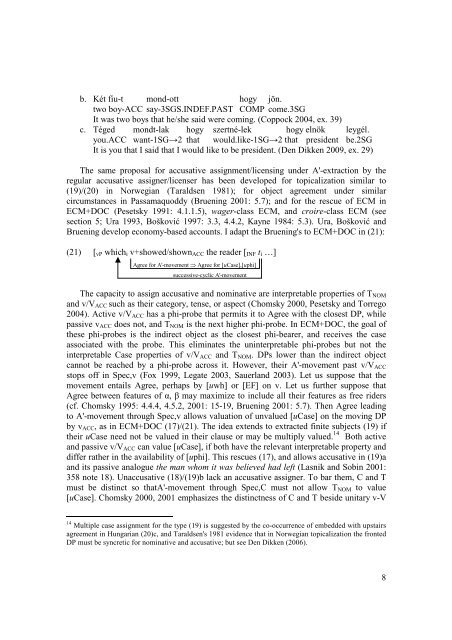Case Filter - UMR 7023 - CNRS
Case Filter - UMR 7023 - CNRS
Case Filter - UMR 7023 - CNRS
Create successful ePaper yourself
Turn your PDF publications into a flip-book with our unique Google optimized e-Paper software.
. Két fiu-t mond-ott hogy jön.<br />
two boy-ACC say-3SGS.INDEF.PAST COMP come.3SG<br />
It was two boys that he/she said were coming. (Coppock 2004, ex. 39)<br />
c. Téged mondt-lak hogy szertné-lek hogy elnök leygél.<br />
you.ACC want-1SG→2 that would.like-1SG→2 that president be.2SG<br />
It is you that I said that I would like to be president. (Den Dikken 2009, ex. 29)<br />
The same proposal for accusative assignment/licensing under A'-extraction by the<br />
regular accusative assigner/licenser has been developed for topicalization similar to<br />
(19)/(20) in Norwegian (Taraldsen 1981); for object agreement under similar<br />
circumstances in Passamaquoddy (Bruening 2001: 5.7); and for the rescue of ECM in<br />
ECM+DOC (Pesetsky 1991: 4.1.1.5), wager-class ECM, and croire-class ECM (see<br />
section 5; Ura 1993, Bošković 1997: 3.3, 4.4.2, Kayne 1984: 5.3). Ura, Bošković and<br />
Bruening develop economy-based accounts. I adapt the Bruening's to ECM+DOC in (21):<br />
(21) [ vP which i v+showed/shown ACC the reader [ INF t i …]<br />
Agree for A'-movement ⇒ Agree for [u<strong>Case</strong>],[uphi]<br />
successive-cyclic A'-movement<br />
The capacity to assign accusative and nominative are interpretable properties of T NOM<br />
and v/V ACC such as their category, tense, or aspect (Chomsky 2000, Pesetsky and Torrego<br />
2004). Active v/V ACC has a phi-probe that permits it to Agree with the closest DP, while<br />
passive v ACC does not, and T NOM is the next higher phi-probe. In ECM+DOC, the goal of<br />
these phi-probes is the indirect object as the closest phi-bearer, and receives the case<br />
associated with the probe. This eliminates the uninterpretable phi-probes but not the<br />
interpretable <strong>Case</strong> properties of v/V ACC and T NOM . DPs lower than the indirect object<br />
cannot be reached by a phi-probe across it. However, their A'-movement past v/V ACC<br />
stops off in Spec,v (Fox 1999, Legate 2003, Sauerland 2003). Let us suppose that the<br />
movement entails Agree, perhaps by [uwh] or [EF] on v. Let us further suppose that<br />
Agree between features of α, β may maximize to include all their features as free riders<br />
(cf. Chomsky 1995: 4.4.4, 4.5.2, 2001: 15-19, Bruening 2001: 5.7). Then Agree leading<br />
to A'-movement through Spec,v allows valuation of unvalued [u<strong>Case</strong>] on the moving DP<br />
by v ACC , as in ECM+DOC (17)/(21). The idea extends to extracted finite subjects (19) if<br />
their u<strong>Case</strong> need not be valued in their clause or may be multiply valued. 14 Both active<br />
and passive v/V ACC can value [u<strong>Case</strong>], if both have the relevant interpretable property and<br />
differ rather in the availability of [uphi]. This rescues (17), and allows accusative in (19)a<br />
and its passive analogue the man whom it was believed had left (Lasnik and Sobin 2001:<br />
358 note 18). Unaccusative (18)/(19)b lack an accusative assigner. To bar them, C and T<br />
must be distinct so thatA'-movement through Spec,C must not allow T NOM to value<br />
[u<strong>Case</strong>]. Chomsky 2000, 2001 emphasizes the distinctness of C and T beside unitary v-V<br />
14 Multiple case assignment for the type (19) is suggested by the co-occurrence of embedded with upstairs<br />
agreement in Hungarian (20)c, and Taraldsen's 1981 evidence that in Norwegian topicalization the fronted<br />
DP must be syncretic for nominative and accusative; but see Den Dikken (2006).<br />
8

















